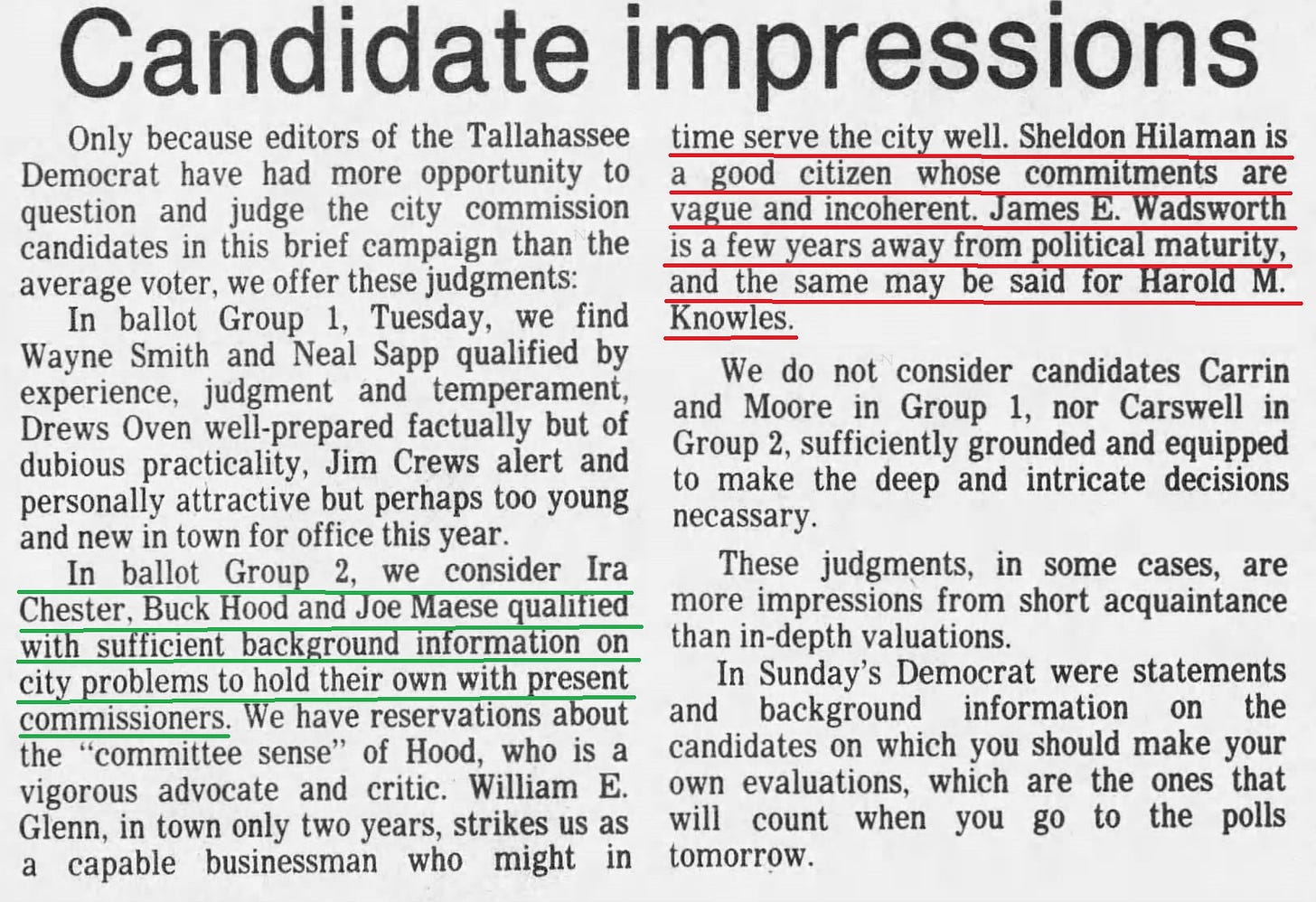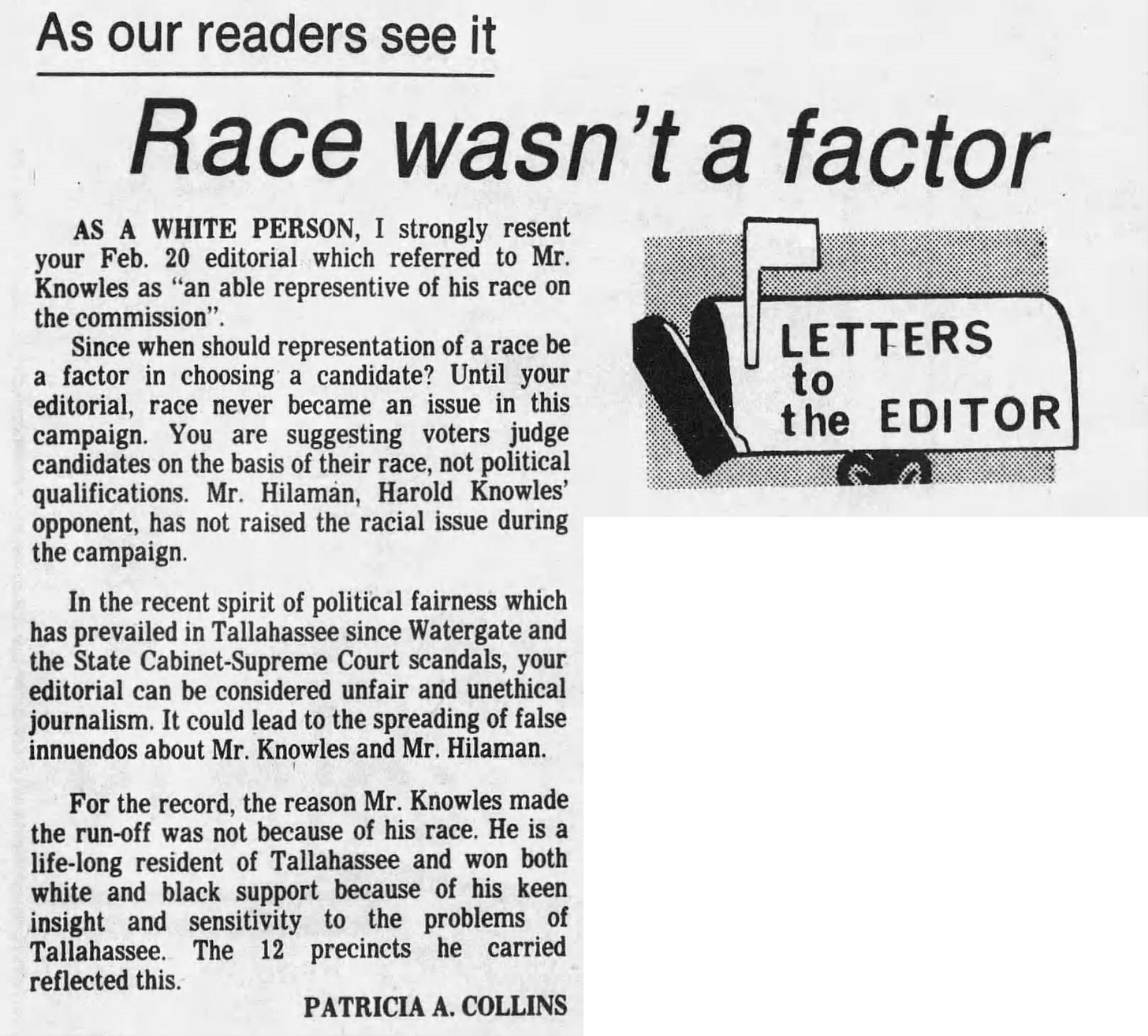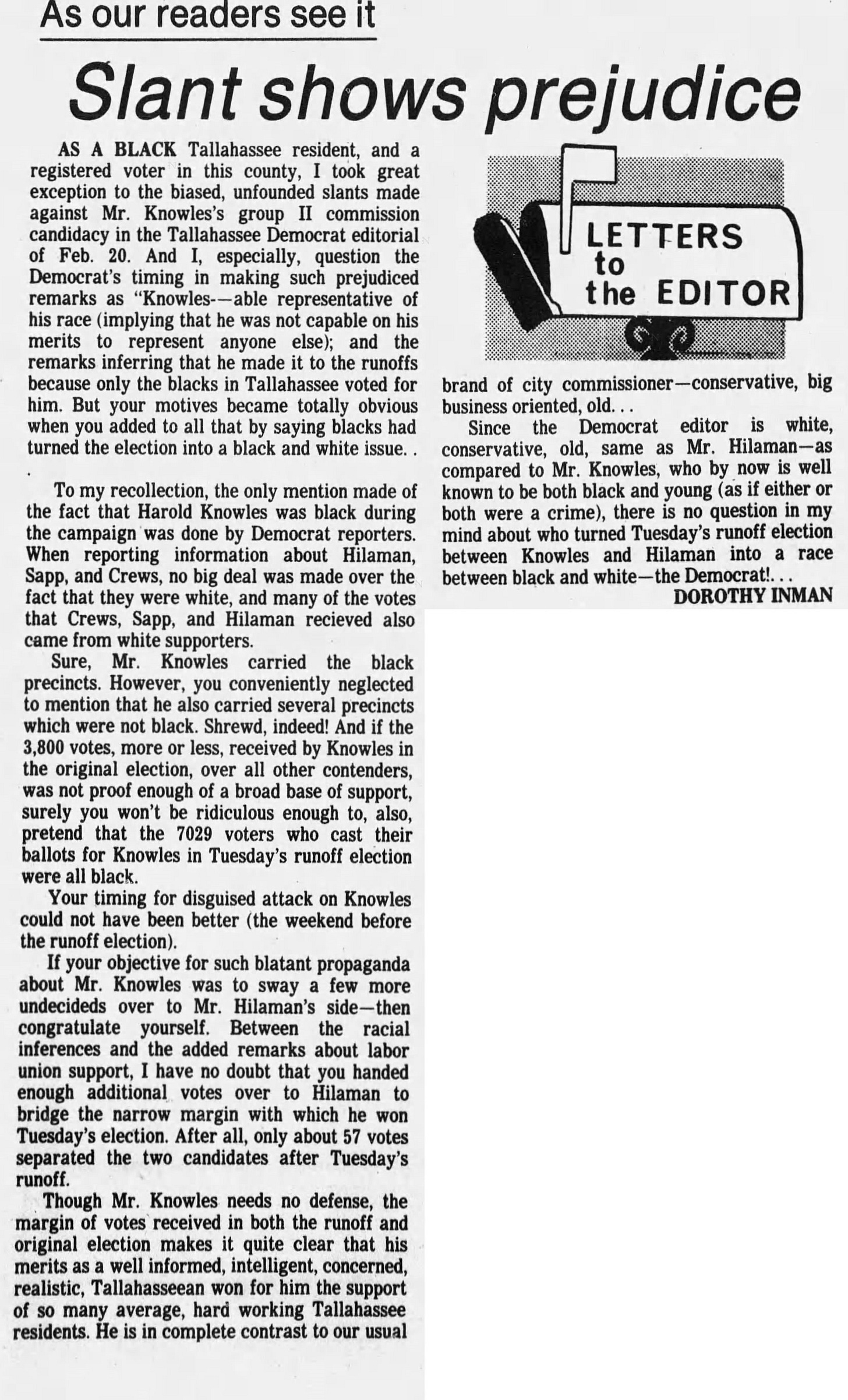Issue #189: Black Representation in Tallahassee Part 8: The Disrespect shown to Harold Knowles
When being a lawyer isn't enough
Today is Part 8 of my series on Black political power in Tallahassee, Florida. This is a series I have been working on since February to document the rise of Black candidates and black voters in Florida’s capital city.
A list of each article can be seen here.
In my last issue, I discussed the increased tensions bubbling up within the city’s politics due to budget worries, internal divisions, and several resignations. Amidst this, I discussed how James Ford, the city’s lone Black commissioner, worked to navigate the fraught politics by maintaining his support among the white majority while also advocating for Black issues when he could. Meanwhile, more outspoken and liberal Black candidates like Rosa Houston went down in large electoral defeats and were subjected to biased press coverage.
This issue will focus on the 1976 election, a very revealing year for the state of Black voting power in the city. In 1976, two commission seats would be open; being vacated by incumbents Don Price and Earl Yancy. This article would focus much more on the contest for seat 2. That race would see the entry of Harold Knowles, a young black attorney who found himself on the negative end of some serious press bias.
The 1976 Primary Campaign
The two commission districts open in 1976 saw a massive number of candidates file. In the Seat 1 contest, six candidates filed. Meanwhile in Seat 2, a staggering eight candidates filed. It was in this field of eight that Harold Knowles found himself. The 28 year old attorney was the lone Black candidate to file for either seat.
Knowles’ opponents in the contest were
D.L. Hood - The owner of a local insurance agency
Jose Maese - The owner of “Maese’s Television Sales and Service”
Clyde Carswell - An engineer
Ira Chester - A local businessman
Sheldon Hilaman - An elementary school principle
James Wadsworth - A CPA
Bill Glenn - Also an engineer who moved to the city 2 years ago
In the campaign, Knowles argued he was running the most on a specific platform rather than focusing on the problems and controversy that had arisen over pay increases and the like. He especially focused on the needs to invest in alternative energy and mass transportation; something very reticent for the times considering the energy crisis. Thanks to massive population growth and hence increased traffic, road widening was also a major point of contention at this time. Knowles was firm in the risk of road expansion that would destroy the integrity of neighborhoods. - saying the proposed widening of Thomasville road was “going to destroy a part of the city that I want to keep.” In this, Knowles was ahead of his time for understanding that public transport is better for alleviating traffic vs road widening.
A notable departure from past years was that candidates broadly supported the city being involved in social services. This is something I discussed in my articles on Rosa Houston - who was notable for being one of few candidates at the time to argue the city should aid residents more. While candidates all framed aid around “only within the budget” - this was still a notable shift from an era where candidates largely would say social services were entirely the responsibility of the state or federal government.
One other major issue during this campaign revolved around commissioner pay. In the runoff elections, voters would be casting ballots on a charter amendment to reduce commissioner pay. This came from the June 1975 vote by commissioners to raise their pay from $7,100 ($40,000 in today’s money) to $16,175 ($90,000 in today’s money). The raise put city pay at the same level as county commissioners. Several members who voted for the pay increase said they personally did not intend to take the raise, but wanted to bring the city in line with the county. At this point, like today, a vast majority of Leon County voters do live within the City of Tallahassee. Regardless of merits on the issue, the raise at a time of financial cuts stoked massive anger with residents. Essentially every candidate, when questioned on the issue, said they would support removing the pay raise or at least would not accept the extra pay when elected.
When the Tallahassee Democrat covered the race, they gave high estimates of Ira Chester, Buck Hood, and Joe Maese. However, they downplayed Sheldon Hilaman, James Wadwsorth, AND Harold Knowles. Specifically they questioned Knowle’s maturity.
Now Harold Knows was a young candidate, just 28. However, as the Democrat pointed out, he was an attorney three years removed from Law School. Being a young Black attorney in 1976 North Florida is hardly something that doesn’t come with a great deal of grit and adversity. Yet as far as the paper was concerned, Knowles was “unseasoned”, as seen in their final editorial the Sunday before the primary vote.
Knowles was even called “naive” on hard decisions, yet his comments throughout the campaign demonstrated he understood the complex budget issues and had clear ideas on how to improve the city. It is hard to not view these characterizations as just an indictment of the editors not liking his answers. Also, as I have discussed in many previous issues of this series, Black candidates almost always seemed to be held to a higher standard. Knowles, like every other candidate, offered detailed views on several prominent issues at the time. A full breakdown of candidates answers to key questions from the paper can be read here.
Knowles, for his part, leaned into the Tallahassee Democrat critique, arguing being “unseasoned” meant he wasn’t part of the good-ol boy club. Another Knowles add clearly highlighted his goals.
The irony was that while Knowles and Hilaman got negative remarks from the Democrat, both were the strongest fundraisers in the campaign. Knowles raised $2,600 ($15,000 today) while Hilaman raised $2,100 ($12,000 today).
When the final primary results came in on February 10th, Harold Knowles was in clear first place; securing 36% of the vote. Sheldon Hilaman, meanwhile, came in 2nd with 18% and advanced to the runoff.
Knowles dominated in the heavily black precincts of the city: namely 19, 21, and 17. He was also strong in the FSU-dominated precincts of 4 and 16, and did well in several white precincts. Race map of Tallahassee here. Knowles notably did better than James Ford did in 1971; when Ford got 32% in the primary before winning the that runoff. He came in a clear 1st thanks to the Black community, but also had a great deal of white backing.
Both Knowles and Hilaman would have just two weeks for the runoff campaign.
The 1976 Runoff Campaign
The runoff timeframe, like always, was short, giving candidates only two weeks to consolidate support. None of the eliminated candidates endorsed either Hilaman or Knowles. Both worked quickly to convince voters and raise money. For the runoff, Knowles raised another $1,600 ($9,000 today) Hilaman raised another $1,500 ($8,500 today).
A bit of the coverage of both campaigns can be seen below.
The lines I underlined in red highlight an important racial factor in this runoff. With Knowles in the runoff, a great deal of commentary emerged about Knowles and Ford being a “block” vote since both were Black. Knowles deftly deflected this by pointing out it could also be argue he and Ben Thompson (a white commissioner) could be a “block” because both were lawyers. The fact this was a point of discussion is not surprising but still incredibly depressing. That issue, however, paled in comparison to what was seen from the Tallahassee Democrat in its editorial before the runoff.
The final editorial on the race is a truly stunning series of paragraphs. In the Group 2 contest, the editors say that they had major issues with Knowles and Hilaman. For Hilaman, they complain about his vague answers and questioned why he doesn’t have more clear-cut views considering his decades in public service. Fair points. When talking about Knowles, however, they cannot help but bring things to race. They outright lament the fact that Knowles won with such a strong share of the Black vote. As they saw it, they thought Tallahassee “had gone beyond that.” Showing a stunning lack of understanding for the continued fight for Black voices to be heard in city hall.
The editorial states Knowles “would be an able representative of his race on the commission” but “there is more to the job than racial representation.” What an absolutely stunning thing to say about an attorney running on a very detailed policy platform. They even admit he provides clearer answers; like that he would side with the public employees union, albeit saying they don’t agree with his answer. They minimize his biography and reduce him as a “token” candidate while still admitting he provides clearer answers than his opponent. In this, their hostility to him stands out clear as day.
I was absolutely stunned to read such a blatantly racist hit job from the paper as late as 1976. More than anything, this shows how much uphill fight black candidates had. Many other readers were stunned as well, as several “Letters to the Editor” were submitted taking the paper to task. This one came from a white Knowles backer.
The runoff election was held February 24th. In a nail-biter race, Sheldon Hilaman surged past Knowles and won by just 57 votes.
Pardon me for inserting my personal politics here, but this is a heartbreaking loss. Its easy to imagine residual concerns about having “two Black commissioners” - egged on by the Democrat’s framing of Knowles and young and naïve, could have swung some voters. Knowles, like in the primary, secured major margins in the heavily Black and student precincts, but he lost outside of that core block. That said, compared with Rosa Houston’s 1974 effort, Knowles had much better margins in the heavily white suburbs; some areas where Houston could not even crack 20%. Knowles was certainly the first Black candidate to come close at replicating the success of James Ford, but the circumstances around his loss are incredibly disappointing.
The same day as the commission races, voters in the city passed two charter amendments. The first repealed the city pay increase; passing with 83% of the vote. Notably though support for the repeal was lower in the heavily Black precincts. Meanwhile the measure to change commission terms from 3 to 4 years easily passed with modest support across all precincts.
Harold Knowles would remain active in local politics for many years to come. He would be involved in the City/County consolidation debate that took place in the fall of 1976, something I will be covering in a separate issue.
In the days after the runoff, the Tallahassee Democrat would continue to be dogged by its coverage. On March 3rd, another letter to the editor called out the Democrat for its prejudice.
That piece was written by a young Dorothy Inman, someone who we will be talking about a great deal in future issues. Why is that? Because in the 1980s, “Dot” - as she is often referred - would make history as Tallahassee’s first Black female city commissioner.












